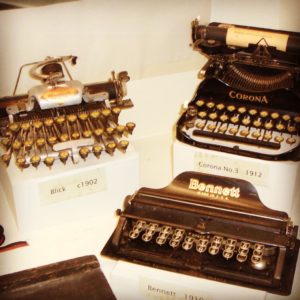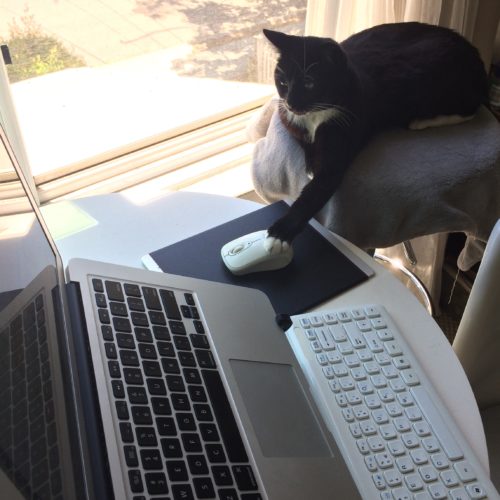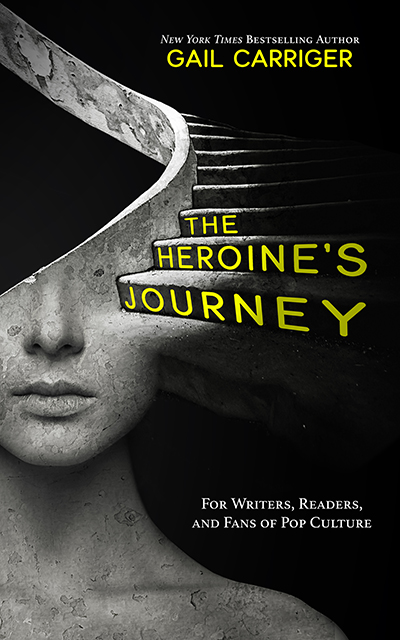So, Gentle Reader,
I tend to think in terms of 3 different types of writing modes. I haven’t talked much with other authors and I’m sure everyone is different, but I thought perhaps you’d like a glimpse into my divisions of author ability, as it were.

1. Work Writing
Both the hardest and most common, this is the type of writing that feels like sweating blood. This is when I sit down and squeeze out the words, one after another.
I try not to question myself, and just do it because I must, because it’s my job, and because I have a deadline. I make up games and bribe myself. I’ll do lots of silly things just to force myself to write those 2000 words for that day.
When us authors talk about “training writer muscles,” this is the kind of writing we mean. The work of it. The business of it.
If you want to be a career author I devoutly believe you must learn how to execute this kind of writing and never to rely on the other two.

2. Fugue Writing
I can’t remember who first used the term fugue with me, but I definitely stole it from someone (possibly one of the Armenian Lovers). I don’t like the idea of a muse (to me muse feels like I’m giving someone else credit for my work, talk to the Ancient Greeks about it).
However, to use that analogy, fugue is the state when the muse has you in her warm embrace. Fugue is the best of writing. It’s being transported and having the words flow out of you. It’s the fingertips as conduit for something else. I think of the something else as my subconscious. (Sometimes it’s Lord Akeldama.)
Fugue is when writing is fun and easy. For hobby writers, this can be the only type of writing that you do. I used to be like that in high school and college, only writing when I felt motivated.
Chasing fugue, however, is the death nell for the professional author. It can’t be caught and you waste valuable time if you sit around waiting for it to drop. Instead you must activate Work Writing. It can also be dangerous if it happens too much in a book. To me it’s like a natural writer’s high, and I don’t want to depend upon it to get me typing in the morning. I find if I’ve had a run of fugue on a book then it is that much harder to motivate to finish.

3. Trance Writing
Trace is the rarest writing mode, for me. It’s not always pleasant, particularly for those around me. Fugue I usually welcome, immerse myself in happily, and then hop back out of, like a delightful swim in a cool lake.
Trance is more like a wicked undertow. It drags me in and keeps me there sometimes for days. It’s hugely productive and I can double or even triple my word count, occasionally more than that, but I’m also absent.
Even if I physically stop writing but I’m still there in my head, and pretty much anything and everything can cause a return to the computer. It can be painful on my body because I just forget things: food, posture, exercise, wrist pain.
Witness this conversation when I entered trance state over Poison or Protect:
AB: What do you mean you forgot to eat?
Gail: I remembered eventually. I also didn’t play with the cat.
AB: Poor little Lilliput!
Gail to the cat: I am sorry Lilliput. I’m just not really here right now. I’m somewhere in southern England in 1867. I promise, I’ll return eventually.
That’s what it feels like, usually for 24-48 hours I’m just absent, somewhere else.
Fortunately, or unfortunately, this only happens once or twice a year.

Now shall I tell you the great secret regarding all 3 of these modes?
The Glorious Truth
The reader will never know the difference.
In fact there’s a good chance when you go back a reread it yourself, you won’t be able to tell the difference. I never can. The hard working parts, the times it was like pulling teeth to get that daily word count done, the easy fugue times when the imagery simply flowed out of me, the rare and disconcerting trance times…
You know what?
They all read the same in the end.
They all require editing. LOTS of editing. They were equally good and equally crap.
The point, in the end, is to sit down at the computer and type.
Yours (under deadline).
Miss Gail
P.S. Congrats to the 2016 Rita Winners. Personal shout out to Alexis Hall’s For Real which took the erotic romance category and Sarina Bowen & Elle Kennedy’s Him which won mid-length contemporary romance. I read and enjoyed both these books, and it’s lovely to see gay romance step in and take a non-LBGTQ specific categories!
BOOK DE JOUR
- Tired of the hero’s journey?
- Frustrated that funny, romantic, and comforting stories aren’t taken seriously?
- Sad that the books and movies you love never seem to be critically acclaimed, even when they sell like crazy?
The Heroine’s Journey is here to help.
Multiple New York Times bestselling author Gail Carriger presents a clear concise analysis of the heroine’s journey, how it differs from the hero’s journey, and how you can use it to improve your writing and your life.
Quote of the Day:
“Once we had been friends, once we had been lovers. And now we were just two people who knew each other too well, who had—through carelessness, not malice—hurt each other too much.”
~ Glitterland by Alexis Hall
Questions about Gail’s steampunk world? There’s a wiki for that!


Ohmigosh, mee too! Only I have four stages.
My trance state is called “Obsession”. It’s where the writing is consuming me, demanding that I must put aside everything, including basic survival stuff like sleep and food and WRITE. Fortunately, that only lasts a maximum of 72 hours. Unfortunately, it means I must wrestle it when Life things Must Happen (like the Day Job).
Then I have Focus (Fugue), where writing is a joy and I can get much wordage done.
Then there’s Work, where writing’s not so much a joy, but it needs doing. This takes more energy than Focus because my brain wants to drift elsewhere.
Then I have a fourth stage beyond that. I didn’t learn about this until I dedicated myself to being a professional author. This I call Fight stage. It’s where my head & heart absolutely, positively DO NOT want to work. If I was still a hobbyist, this would be when I go do something else. But if I have a deadline (self-imposed or editor-imposed), this is when I force myself to sit down and wrestle every.single.word for supremacy. This is a very hard stage. I have to have enough energy to be able to do this, because I literally fight to get words down.
I definitely notice a difference in the quality of my writing. Fight writing is stiff and a bit stilted. Obsession is too loose and uncontrolled. Focus and Work are my best product, with Work being maybe that bit more refined.